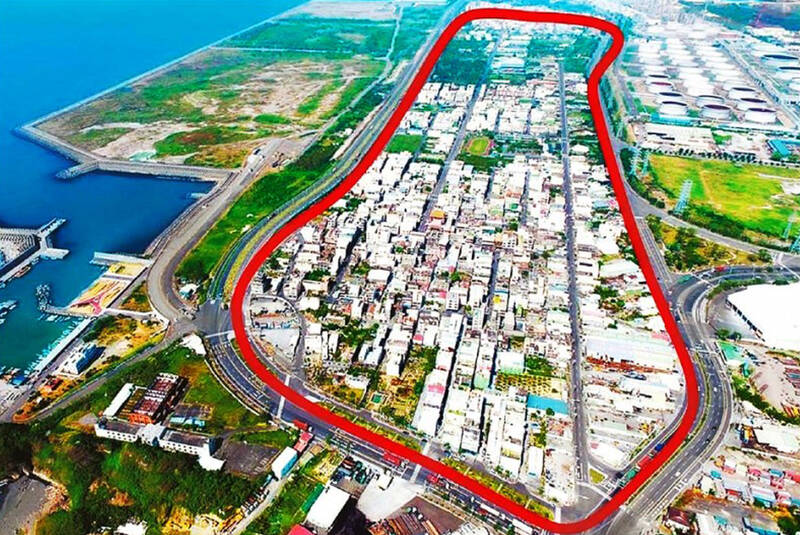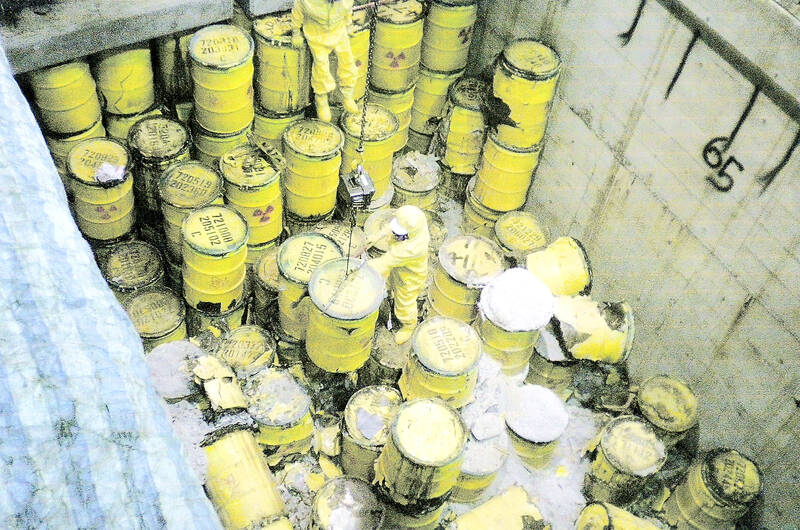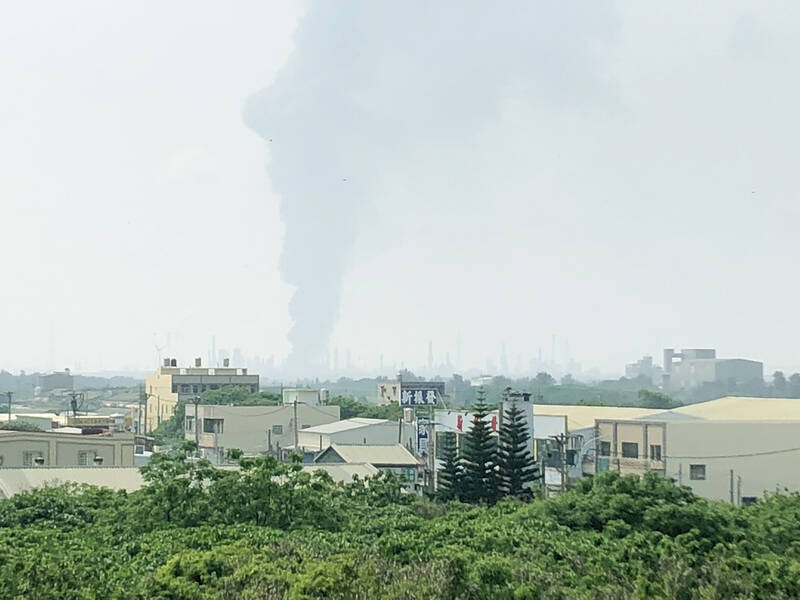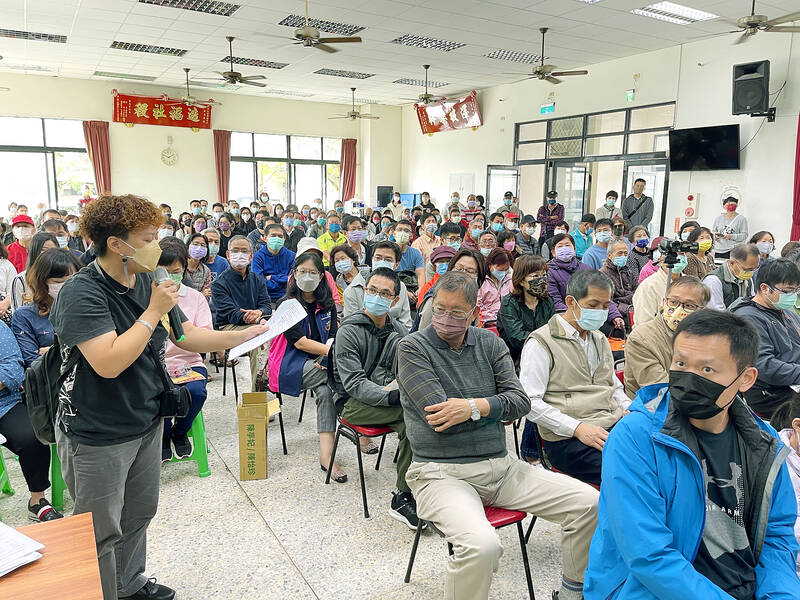The opportunity that brought Ming Turner (陳明惠) back to Taiwan a decade ago had an environmental theme, but since then, she admits, paying attention to environmental issues “hasn’t really been my thing.”
Turner, who attended graduate school in the UK, initially returned to curate an event in Kaohsiung’s Cijin District (旗津), not far from where she grew up. Some years after she and her husband decided they’d stay in Taiwan, they moved to Tainan’s Annan District (安南) with their two young children. Turner is now an associate professor in the Institute of Creative Industries Design and director of visual and performance arts at the National Cheng Kung University Art Center in Tainan.
In November last year, when she first learned that a private company is planning to build a power plant in neighboring Anding District (安定), Turner was outraged. As she wrote in the Jan. 8 issue of this newspaper, “there are already two power stations affecting air quality in Tainan in particular and southern Taiwan in general.”

Photo courtesy of the Kaohsiung City Government
In her op-ed, Turner said that the proposed Jiuwei Nanke Gas-fired Power Plant (九崴南科天然氣電廠) would be uncomfortably close to the National Museum of Taiwan History (國立臺灣歷史博物館), the Asia-Pacific International Baseball Training Centers (亞太國際棒球訓練中心), a major hospital, several schools and a site earmarked for social housing.
Turner now serves as a representative of Taishibo Community Self-Help Association (台史博社區居民自救會). On March 14, she was quoted by The Reporter (a nonprofit Chinese-language online media) as saying that, while burning gas is less polluting than burning coal, the Jiuwei Plant will emit an estimated 309 metric tons of nitrogen oxides each year. What’s more, because the site is below a flightpath, the plant’s chimney will be no taller than 53m, affecting the diffusion of pollutants.
SUPPLYING OTHERS

Photo courtesy of the office of former DPP legislator Cheng Li-chiun
What incenses many Anding and Annan residents is that the Jiuwei power station isn’t being built to supply local households with electricity, but rather to meet growing demand from Southern Taiwan Science Park tenant companies in the districts of Anding, Shanhua (善化), and Sinshih (新市).
Turner didn’t use the words “environmental justice” in her Jan. 8 article, but the concept is central to her argument: Why should people living in one place accept environmental costs like pollution, when the benefits accrue to those living elsewhere?
Perhaps the best known case of environmental injustice in Taiwan’s recent history is the ongoing saga concerning a storage facility for radioactive waste on Lanyu (蘭嶼, Orchid Island), which is located 64km southeast of Taiwan proper.

Photo courtesy of a reader
Lanyu has no industry, and its population is less than 5,300. Its power needs are met by a single diesel-fired power plant. It hasn’t received a single kWh of electricity from Taiwan’s nuclear power stations.
The storage site was reportedly chosen because no humans live within 5km, and because it would be convenient for the next stage of Taiwan’s plan to get rid of its nuclear waste: Dumping it on the seabed. But before ocean disposal could be arranged, a 1993 extension to the London Convention on the Prevention of Marine Pollution by Dumping of Wastes and Other Matter made the deliberate disposal at sea of such material a contravention of international law.
In 2019, the central government admitted that the island’s residents, who call their homeland Pongso no Tao, were never informed or consulted about the true purpose of the facility, which began receiving barrels of waste from Taiwan’s nuclear power stations in 1982.

Photo: Wang Chun-chung, Taipei Times
To date, no evidence that any islanders have been harmed by the radioactive waste has emerged, although its mere presence may well cause stress and anguish. Lanyu residents receive certain benefits from state-run Taiwan Power Co (Taipower, 台電), including free electricity and free health checkups, yet a quote attributed to James Altucher comes to mind: “If you can’t walk away from a negotiation, then you aren’t negotiating. You’re just working out the terms of your slavery.”
ENVIRONMENTAL RACISM?
Lanyu is the homeland of the Austronesian Tao people, and the decision to put the dump there may be an example of environmental racism. The World Economic Forum’s Web site defines this as a type of systemic racism whereby ethnic minorities are “disproportionately burdened with health hazards” as a consequence of policies “that force them to live in proximity to sources of toxic waste” such as landfills and power stations.
Before choosing Lanyu, the authorities reportedly considered 14 sites across Taiwan’s outlying islands. The 13 that were near Han communities (more than 97 percent of Taiwan’s population is of Han descent) were all rejected.
Asked if her recent activism has led her to recognize other examples of environmental injustice, Turner mentions the No 6 naphtha cracker complex’s impact on human health in Yunlin County’s Taisi Township (台西), the suffering of the residents of Dalinpu (大林蒲) in Kaohsiung’s Siaogang District (小港) and the controversial development of a landfill for hazardous industrial waste in Tainan’s Longci District (龍崎).
A 2018 study published in the Journal of the Formosan Medical Association concluded that the “all-cause cancer incidence rate of Taisi residents was 2.55 times higher than Dacheng (大城) residents… and 2.43 times higher than Jhutang (竹塘) residents… cancer risk was significantly increased for Taisi residents living near the No 6 naphtha cracker complex.”
Some years ago, the authorities announced plans to relocate 20,000 people from Dalinpu — but some residents argue that the polluting factories surrounding the community should be moved, not the families who’ve lived there for decades.
The Longci case has also dragged on. Part of the site, which is adjacent to Neopu Mudstone Area Soil and Water Conservation Park (牛埔泥岩水土保持教學園區), was designated a nature reserve in 2021, and the Ministry of Economic Affairs formally withdrew the landfill plan last year.
However, as recently as Feb. 23, the Chinese-language China Times reported that environmentalists in Tainan fear a lawsuit by the company seeking to develop the site might result in the project’s resurrection.
In addition to working with and through the media, Turner has expressed her opposition to the Jiuwei Power Plant by initiating an online petition and writing to the Presidential Office. Asked if the threat she perceives from the plant has caused her to rethink her day-to-day behavior, she answers in the affirmative.
“It’s definitely inspired me to reconsider my views on consumption,” she says. “People should reduce their desire for material things, so factories don’t have to produce so much. Everything we take comes from the Earth, and resources are limited.”
Steven Crook, the author or co-author of four books about Taiwan, has been following environmental issues since he arrived in the country in 1991. He drives a hybrid and carries his own chopsticks. The views expressed here are his own.

On the Chinese Internet, the country’s current predicament — slowing economic growth, a falling birthrate, a meager social safety net, increasing isolation on the world stage — is often expressed through buzzwords. There is tangping, or “lying flat,” a term used to describe the young generation of Chinese who are choosing to chill out rather than hustle in China’s high-pressure economy. There is runxue, or “run philosophy,” which refers to the determination of large numbers of people to emigrate. Recently, “revenge against society” attacks — random incidents of violence that have claimed dozens of lives — have sparked particular concern.

Some people will never forget their first meeting with Hans Breuer, because it occurred late at night on a remote mountain road, when they noticed — to quote one of them — a large German man, “down in a concrete ditch, kicking up leaves and glancing around with a curious intensity.” This writer’s first contact with the Dusseldorf native was entirely conventional, yet it led to a friendly correspondence that lasted until Breuer’s death in Taipei on Dec. 10. I’d been told he’d be an excellent person to talk to for an article I was putting together, so I telephoned him,

With raging waters moving as fast as 3 meters per second, it’s said that the Roaring Gate Channel (吼門水道) evokes the sound of a thousand troop-bound horses galloping. Situated between Penghu’s Xiyu (西嶼) and Baisha (白沙) islands, early inhabitants ranked the channel as the second most perilous waterway in the archipelago; the top was the seas around the shoals to the far north. The Roaring Gate also concealed sunken reefs, and was especially nasty when the northeasterly winds blew during the autumn and winter months. Ships heading to the archipelago’s main settlement of Magong (馬公) had to go around the west side

From an anonymous office in a New Delhi mall, matrimonial detective Bhavna Paliwal runs the rule over prospective husbands and wives — a booming industry in India, where younger generations are increasingly choosing love matches over arranged marriage. The tradition of partners being carefully selected by the two families remains hugely popular, but in a country where social customs are changing rapidly, more and more couples are making their own matches. So for some families, the first step when young lovers want to get married is not to call a priest or party planner but a sleuth like Paliwal with high-tech spy